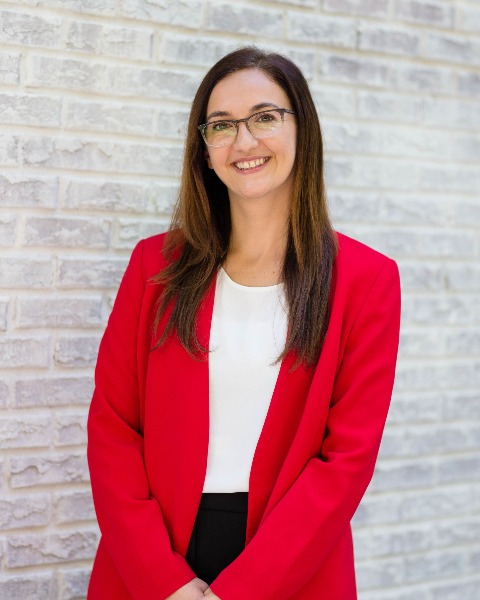 Patricia Bloom, MD
Patricia Bloom, MD
Assistant Professor, University of Michigan
Dr. Patricia Bloom is an Assistant Professor and Transplant Hepatologist at the University of Michigan. She is a graduate of Harvard University (2007) and the University of Massachusetts Medical School (Doctorate of Medicine, 2013), and completed internal medicine residency, gastroenterology and transplant hepatology fellowships at Massachusetts General Hospital (2013-2020). She performs clinical and translational research to improve outcomes in decompensated cirrhosis, especially for hepatic encephalopathy. Her long-term goals are to create and test innovative microbiome therapies to treat hepatic encephalopathy and other cirrhosis complications.
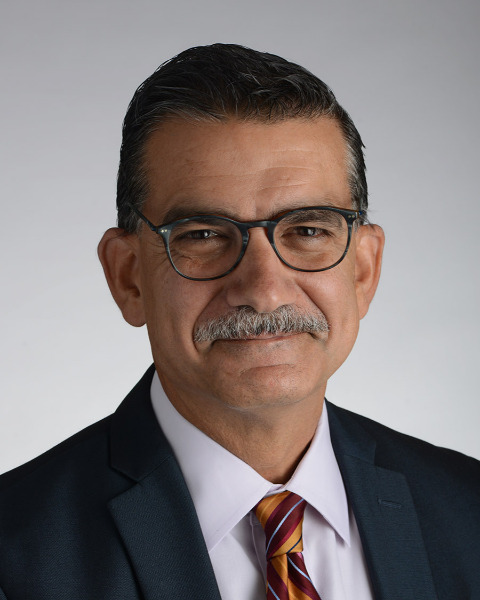 Mario Castro, MD, MPH
Mario Castro, MD, MPH
Professor of Medicine, Vice Chair for Clinical and Translational Research, Department of Medicine, Chief, Division of Pulmonary, Critical Care and Sleep Medicine at University of Kansas Medical Center
Dr. Castro is the L. E. Phillips and Lenora Carr Phillips Professor of Medicine, Vice Chair for Clinical and Translational Research, Department of Medicine, Chief, Division of Pulmonary, Critical Care and Sleep Medicine at University of Kansas Medical Center (KUMC), and Director of the Frontiers: University of Kansas Clinical and Translational Science Institute and Adjunct Research Professor at the University of Missouri-Kansas City School of Medicine. He has been a leader of the CDC Controlling Asthma in American Cities, American Lung Association Airway Clinical Research Centers, and NHLBI Asthma Clinical Research Network, Severe Asthma Research Program, AsthmaNet and PrecISE research networks. His translational research projects in the Asthma and Airway Translational Research Unit (AATRU) are focused on the pathogenesis of asthma and treatment of asthma, especially in severe disease. Recently, Dr. Castro has spearheaded several initiatives to combat the COVID-19 pandemic: Lead investigator for NIH/NIAID-funded COVID-19 Prevention Trials Network (CoVPN trial), ACTIV-2 trial and the PCORNET HERO HCQ trial. He is the author of over 30 chapters/books and over 300 peer-reviewed articles; over the past 25+ years, Dr. Castro has trained over 40 junior clinical & translational scholars. He is widely recognized as an expert clinician, an excellent mentor, and skilled educator with a significant commitment to the development of young investigators’ careers.
 Jesse Davidson, MD, MPH, MSc
Jesse Davidson, MD, MPH, MSc
Associate Medical Director, Children's Hospital Colorado Research Institute/Associate Professor, Pediatrics
Jesse Davidson, MD, MPH, MSc is an Associate Professor of Pediatrics at Children's Hospital Colorado with dual board certification in pediatric cardiology/critical care and additional training in cardiac imaging. His research focuses on the systems biology and therapy of multi-organ injury after infant cardiac surgery, with a particular interest in leveraging metabolomic and proteomic techniques to explore the complex molecular pathways activated during postoperative injury and recovery. His current NHLBI-funded work targets tryptophan metabolism through the kynurenine pathway and downstream de novo NAD production, both in infants undergoing CHD repair and in a large animal model of cardiopulmonary bypass with deep hypothermic circulatory arrest. Additional projects include a longitudinal multiomic evaluation of pulmonary vascular development in single ventricle patients undergoing staged surgical palliation, funded by the NHLBI, American Heart Association and Additional Ventures. Dr. Davidson also serves as an Associate Medical Director for the Children's Hospital Colorado Child Health Research Enterprise, which provides comprehensive operational support for >400 funded clinical studies and manages integration of research and clinical infrastructure within the hospital and across the University of Colorado medical campus.
 Carmella Evans-Molina, MD, PhD, MS
Carmella Evans-Molina, MD, PhD, MS
Director, IU Center for Diabetes and Metabolic Diseases (CDMD) Diabetes Program Director, Herman B Wells Center for Pediatric Research Director of the Indiana Diabetes Research Center Islet and Physiology Core, Eli Lilly and Company Professor of Pediatric Diabetes
Dr. Carmella Evans-Molina is the Eli Lilly Professor of Pediatric Diabetes at the Indiana University School of Medicine in Indianapolis, IN, where she serves as Director of the IU Center for Diabetes and Metabolic Diseases, Program Leader for the Diabetes Research Group in the Herman B Wells Center for Pediatric Research, and as a Staff Physician at the Roudebush VA Medical Center. Dr. Evans-Molina is an active mentor to MD and PhD trainees at all levels, and she serves as an Associate Director of the Medical Scientist Training Program at IU and as a Co-Director of the Diabetes and Obesity T32 Training Program. She is a Co-Executive Director of the Network for Pancreatic Organ Donors with Diabetes (nPOD), Co-PI of the NIH-funded Integrated Islet Distribution Program, and President of the Immunology of Diabetes Society (IDS). Dr. Evans-Molina’s basic science research is focused on understanding how impaired calcium handling in the secretory pathway contributes to β cell dysfunction in diabetes. In addition, she has a clinical research interest focused on defining the natural history of β cell loss in type 1 diabetes and the use of “omics” approaches to identify novel serum biomarkers of β cell stress in pre-symptomatic diabetes. Her work is funded by the NIH, the VA, the JDRF, and the Helmsley Charitable Trust. She is an investigator in the NIH-funded Type 1 Diabetes Trialnet, RADIANT, and TIDAPC/DREAM Networks.
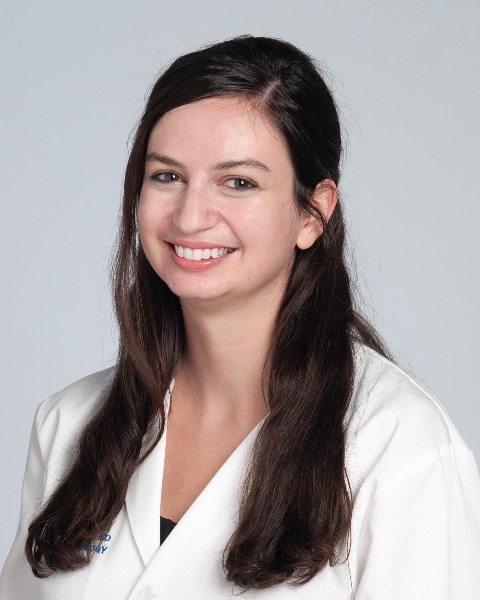 Katherine A. Falloon, MD
Katherine A. Falloon, MD
Inflammatory Bowel Disease Fellow, Cleveland Clinic
Katherine Falloon, MD is currently an inflammatory bowel disease fellow at Cleveland Clinic Foundation (CCF) and will be staying on as faculty upon completion of her fellowship. She completed internal medicine residency at Johns Hopkins Hospital followed by gastroenterology fellowship at CCF. She served as associate editor and then co-editor-in-chief for the American College of Gastroenterology (ACG) Case Reports Journal from 2020-2022. She also served as an editorial fellow for Clinical Gastroenterology and Hepatology last year. She is a member of the ACG Public Relations Committee as well as the ACG Digital Communications and Publications Committee. Her research focus is extra-intestinal manifestations (EIMs) of inflammatory bowel disease. She was awarded grant funding from the Crohn's and Colitis Foundation through the Clinical Research Alliance to lead a national multi-center prospective study of EIMs entitled the Cohort for Healing Arthritis, Skin, and Eye EIMs (CHASE-EIM). Along with Dr. Florian Rieder, she is also leading EIM LIVE, a global educational series on EIMs.
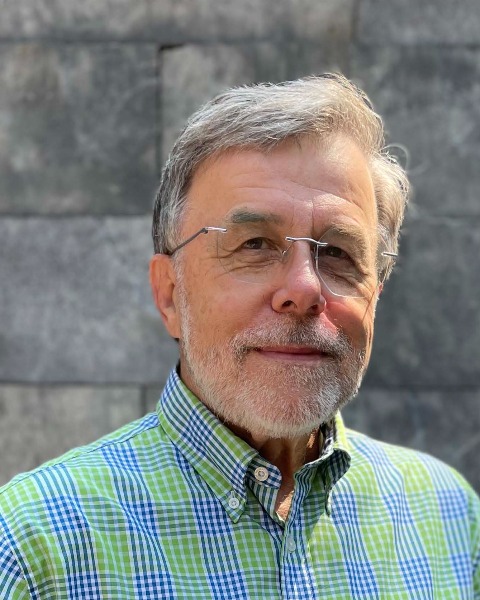 Russell Glasgow, PhD
Russell Glasgow, PhD
Research Professor, Department of Family Medicine University of Colorado/Director, ACCORDS Dissemination and Implementation Science (D&I) Program
Dr. Glasgow is Research Professor of Family Medicine at the University of Colorado and Director of the Dissemination and Implementation Science (D&I) Program at the Adult and Child Center for Outcomes Research and Delivery Science (ACCORDS https://bit.ly/2BnJzuk). He is an internationally known expert in studying ways to improve the translation of research into practice. Dr. Glasgow is one of the developers of the RE-AIM (www.re-aim.org), PRISM and Dynamic Sustainability frameworks.
He focuses on designing and evaluating feasible, cost-effective, equitable multi-level prevention and illness management programs. Dr. Glasgow has published over 500 articles, been the PI on 25 NIH or AHRQ grants, and is among the top 1% of most frequently cited social scientists (Clarivate). He currently focuses much of his time on mentoring, training, and building capacity in implementation science.
 Frederick G. Hamel, PhD
Frederick G. Hamel, PhD
Associate Chief of Staff for Research, VA Nebraska-Western Iowa Health Care System, and Professor, University of Nebraska Medical Center
Dr. Frederick Hamel is the Associate Chief of Staff (ACOS) for Research at the VA Nebraska-Western Iowa Health Care System and a Professor of Internal Medicine at the University of Nebraska Medical Center in the Division of Diabetes, Endocrinology and Metabolism (DEM). He got his BS degree in Biochemistry at the University of Illinois, Champaign-Urbana. His Ph.D. degree is in Pharmacology from the Indiana University School of Medicine at Indianapolis.
Dr. Hamel’s work has centered on insulin-degrading enzyme (IDE) and its role in the etiology of type 2 diabetes. His studies have revealed the cleavage sites on insulin, the intracellular location of insulin degradation, the factors that control IDE’s activity and the effects on insulin action. He has also examined the contribution of immunosuppressants to insulin resistance and post-transplant diabetes. He has been a reviewer for a variety of publications including Diabetes, Endocrinology, Endocrine Reviews, Biochemical Pharmacology, and PNAS, among many others. He has been a member of peer-review boards for NIH, DoD and the VA.
 Ajay K. Jain, MD
Ajay K. Jain, MD
Pediatric Gastroenterologist at Cardinal Glennon Children's Medical Center/Medical Director of Pediatric Liver Transplantation at Saint Louis University
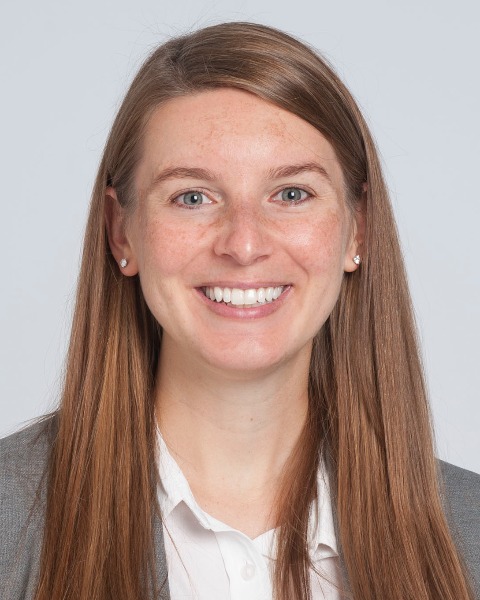 Claire Jansson-Knodell, MD
Claire Jansson-Knodell, MD
Assistant Professor of Medicine, Cleveland Clinic
Claire Jansson-Knodell, MD is an Associate Staff at Cleveland Clinic in the Celiac Disease program. She is an Assistant Professor of Medicine at Case Western Reserve University and Cleveland Clinic Lerner College of Medicine. Her research and clinical interest is in celiac disease, food intolerances (lactose, fructose, non-celiac gluten sensitivity), and enteropathies.
 Michelle Kang Kim, MD, PhD
Michelle Kang Kim, MD, PhD
Chair of the Department of Gastroenterology, Hepatology and Nutrition with Cleveland Clinic’s Digestive Disease & Surgery Institute
Dr. Kim is currently Chair of the Department of Gastroenterology, Hepatology, and Nutrition at Cleveland Clinic. She is also the current President of the Korean-American Medical Association and Chair of the Carcinoid and Neuroendocrine Tumor Section of the American Gastroenterological Association.
Prior to Dr. Kim’s recent transition to Cleveland Clinic, Dr. Kim was Vice Chair for Faculty Affairs for the Department of Medicine at the Icahn School of Medicine, Professor of Medicine and Co-Director of the Center for Carcinoid and Neuroendocrine Tumors, and President of the Faculty Council at Mount Sinai. Dr. Kim has also served as the President of the New York Society for Gastrointestinal Endoscopy.
Dr. Kim earned her undergraduate degree from Harvard College and her medical degree from Stanford University School of Medicine. She completed her postgraduate training in internal medicine and gastroenterology at New York Presbyterian Hospital (Cornell). She has lectured nationally and internationally on carcinoid and neuroendocrine tumors and is known for her work in translational and epidemiologic approaches in assessing outcomes in these patients. Dr. Kim is also interested in early detection of gastrointestinal cancers and in addressing disparities in underserved populations.
Dr. Kim has received research funding from the American Cancer Society, the Neuroendocrine Tumor Research Foundation, the Mount Sinai CTSA, the Carcinoid Cancer Foundation, and the Neuroendocrine Tumor Research Foundation. Dr. Kim has published more than 80 publications in journals such as the Journal of Clinical Oncology, Gastroenterology, and NEJM Catalyst. Dr. Kim is strongly committed to the career development of medical trainees and junior faculty, especially those of women and underrepresented minorities. Dr. Kim has won numerous teaching awards and has mentored more than five dozen medical students, residents, gastroenterology fellows, and junior faculty.
Dr. Kim is currently Chair of the Department of Gastroenterology, Hepatology, and Nutrition at Cleveland Clinic. She is also the current President of the Korean-American Medical Association and Chair of the Carcinoid and Neuroendocrine Tumor Section of the American Gastroenterological Association. Prior to Dr. Kim’s recent transition to Cleveland Clinic, Dr. Kim was Vice Chair for Faculty Affairs for the Department of Medicine at the Icahn School of Medicine, Professor of Medicine and Co-Director of the Center for Carcinoid and Neuroendocrine Tumors, and President of the Faculty Council at Mount Sinai. Dr. Kim has also served as the President of the New York Society for Gastrointestinal Endoscopy.
Dr. Kim earned her undergraduate degree from Harvard College and her medical degree from Stanford University School of Medicine. She completed her postgraduate training in internal medicine and gastroenterology at New York Presbyterian Hospital (Cornell). She has lectured nationally and internationally on carcinoid and neuroendocrine tumors and is known for her work in translational and epidemiologic approaches in assessing outcomes in these patients. Dr. Kim is also interested in early detection of gastrointestinal cancers and in addressing disparities in underserved populations. Dr. Kim has received research funding from the American Cancer Society, the Neuroendocrine Tumor Research Foundation, the Mount Sinai CTSA, the Carcinoid Cancer Foundation, and the Neuroendocrine Tumor Research Foundation. Dr. Kim has published more than 80 publications in journals such as the Journal of Clinical Oncology, Gastroenterology, and NEJM Catalyst. Dr. Kim is strongly committed to the career development of medical trainees and junior faculty, especially those of women and underrepresented minorities. Dr. Kim has won numerous teaching awards and has mentored more than five dozen medical students, residents, gastroenterology fellows, and junior faculty. Michelle Kang Kim, MD, PhD
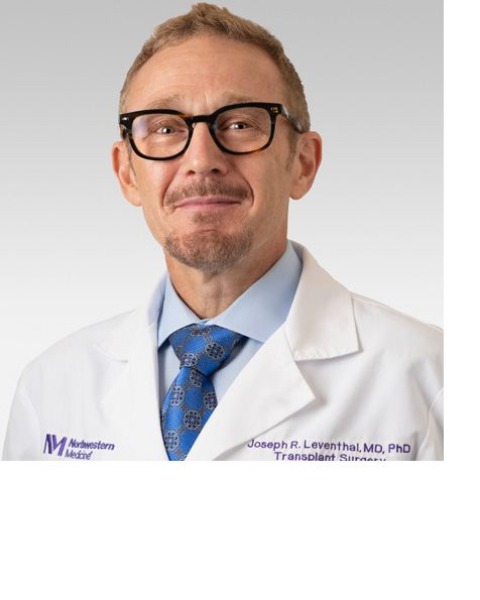 Joseph R. Leventhal, MD, PhD
Joseph R. Leventhal, MD, PhD
Fowler McCormick Professor of Surgery/Professor of Surgery (Organ Transplantation), Northwestern Medicine, Feinberg School of Medicine
Joseph R. Leventhal, MD, PhD currently holds the Fowler McCormick Endowed Professorship in the Department of Surgery at Northwestern University, Feinberg School of Medicine. He is a surgeon scientist with a focus on solid organ transplantation who has been actively involved in basic science, translational, and clinical research for more than 30 years. His research career began with NIH funded research in xenotransplantation, studying mechanisms of hyperacute rejection. This research also involved the use of “first generation” transgenic swine in a life sustaining model of pig to baboon renal xenotransplantation.
Dr. Leventhal has conducted research for the past 20 years focusing upon the use of cell-based therapies for the induction of tolerance in solid organ transplantation. He has served as a lead investigator on an NIH and DOD funded Phase 2 clinical trial of tolerance induction through establishment of chimerism using combined engineered donor stem cell (FCRx) and kidney transplantation in mismatched and unrelated donor/recipient pairs. In addition, He is the PI of a DOD-sponsored grant to further study tolerance in kidney recipients with an emphasis on biomarker development for tolerance.
Dr. Leventhal's research laboratory has also studied regulatory T cells (Tregs) and characterized the ability of isolated and expanded Tregs to prevent transplant rejection. In 2013 he co-founded TRACT Therapeutics, now a clinical stage biotech company that successfully completed a first in human clinical trial of autologous Treg therapy in kidney transplant recipients.
He has extensive leadership experience, having served as the Director of a number of clinical programs during my time at Northwestern. These include the Vascular Access Program, Kidney Transplant Program, and Pancreas Transplant Program. From 2019-2021 Dr. Leventhal served as the interim Division Chief of Abdominal Transplantation at Northwestern. He continues to direct the Kidney Transplant Program and serve as Deputy Director of our Comprehensive Transplant Center.
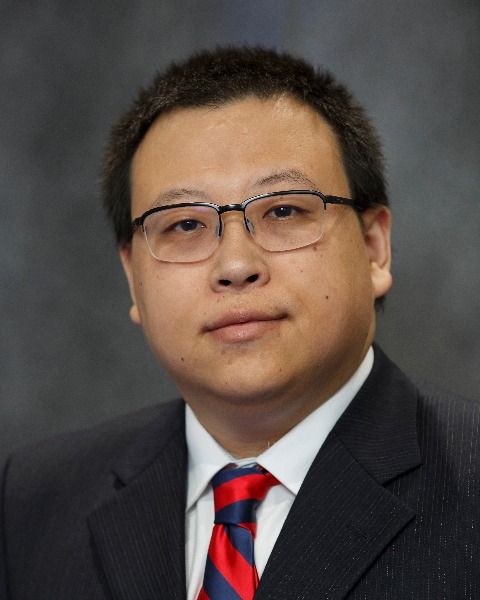 Shuai Li, MD, PhD
Shuai Li, MD, PhD
Instructor, University of Nebraska Medical Center
Dr. Shuai Li, M.D., Ph.D. is a junior faculty at the Department of Surgery – Vascular Surgery Division of the University of Nebraska Medical Center. He works with Dr. Iraklis Pipinos, performing translational and clinical research on Peripheral Artery Disease. Dr. Li’s expertise focuses on quantitative microscopic analysis of tissue Histology and Pathology and their relationship with a patient’s clinical function. Dr. Li serves as the P.I. of an American Heart Association Career Development and AHA-VIVA Physicians Research Award, a Central Society of Clinical and Translational Research Early Career Development Award, a collaboration grant, and a Co-I. of an NIH R01 grant. The work of Dr. Li is also reported in multiple professional media. His hobbies include fishing, basketball, scary movies, and reading manga.
 Roslyn B. Mannon, MD
Roslyn B. Mannon, MD
Vice Chair of Research, Department of Internal Medicine/Professor, Division of Nephrology/Nephrology Associate Chief of Research
Dr. Roslyn Bernstein Mannon is a Professor of Medicine, Pathology and Microbiology at the University of Nebraska Medical Center, Vice-Chair for Research and Associate Chief of Research in Nephrology. Dr. Mannon is a Fellow of the American Society of Nephrology and American Society of Transplantation. A Duke-trained nephrologist, Dr. Mannon is a past-president of the American Society of Transplantation and is a Deputy Editor of the American Journal of Transplantation. Dr. Mannon’s laboratory research focuses on mechanisms of chronic graft injury using in vitro and in vivo models of drug toxicity and kidney transplantation. She has published over 200 peer-reviewed publications on chronic allograft failure, post-transplant complications and therapeutics. Dr. Mannon serves in several leadership positions in transplantation including as a Trustee of the Banff Foundation for Allograft Pathology, co-chair of the Scientific Registry of Transplant Recipients Review Committee, Chair of American Society of Nephology Policy and Advocacy Committee, immediate past-Chair of Women in Transplantation, and a member of the steering committee for the Critical Path Institute’s Transplant Therapeutics Consortium, which is dedicated to accelerating new transplant therapies into practice. She is the 2022 recipient of the American Society of Transplantation’s Senior Achievement Award in Clinical Transplantation.
 Robin Mermelstein, PhD
Robin Mermelstein, PhD
Distinguished Professor of Psychology and Director, Insitute for Health Research and Policy, and Assistant Dean, College of Medicine, University of Illinois Chicago
Robin Mermelstein, PhD, Distinguished Professor of Liberal Arts and Sciences, Psychology Department; Director of the Institute for Health Research and Policy at the University of Illinois at Chicago (UIC), Co-Director of UIC’s Center for Clinical and Translational Science. Dr. Mermelstein’s research ranges from basic mechanisms of health-related behaviors and disease to clinical research, population health and dissemination. Her research has been continuously supported by the NIH since 1987, with a primary focus on understanding and reducing health risk behaviors across all ages and vulnerable populations. She is known for her pioneering work in advanced methods for “real time data capture” (ecological momentary assessments), especially with adolescents and young adults and high risk health behaviors, and for developing innovative health behavior interventions. Much of her career has focused on leading and facilitating cross-institutional transdisciplinary research efforts funded by the NIH and other foundations. Dr. Mermelstein has served on many NIH advisory and review committees and is a past chair of the FDA Tobacco Products Scientific Advisory Committee. She has been acknowledged for her scientific accomplishments by several national and international research societies, including being named a Fellow of the Association of Psychological Science, a Fellow of the Society of Behavioral Medicine, and a Fellow of the Society for Research in Nicotine and Tobacco. She is a past President of the Society for Research on Nicotine and Tobacco.
 Priyanka Ravi, MDS
Priyanka Ravi, MDS
PhD Student - Health Behavior Health Promotion, Graduate Research Associate, Asthma & Airway Disease Research Center, Mel & Enid Zuckerman College of Public Health, University of Arizona
Dr. Priyanka Ravi is a Public Health Dentist by training from India. She has worked with the National Institute of Cancer Prevention and Research (NICPR), India as a Scientist (2016 to 2018) by involving in community level oral cancer screening and providing community level health education on tobacco cessation. She also worked with the WHO FCTC Global Knowledge Hub on Smokeless Tobacco on Global smokeless tobacco control policies which focus on the Article 13 of WHO FCTC on “Tobacco Advertisement, Promotion and Sponsorship” with special focus on Internet sale and flavors added to the smokeless tobacco. She later worked as a Senior Resident in the Department of Public Health Dentistry, All India Institute of Medical Sciences, New Delhi, India (2018 to 2021), and she was involved in the implementation of National Oral Health Program. Provided scientific inputs for developing ‘eDantSeva’ website and she has been a scientific resource person in conducting national training for oral health promotion. She is also a skilled clinician in providing preventive and curative dental services.
Dr. Ravi is currently a second year PhD student in Health Behavior Health Promotion at the Mel and Enid Zuckerman College of Public Health, University of Arizona, and she is currently works as a Graduate Research Associate at the Asthma & Airway Disease Research Center, University of Arizona. Her current research work on the occupational health of tobacco workers in India is funded by the Southern California NIOSH Education and Research Center Pilot Project Research Training Grant, University of California Los Angeles. She has 18 peer-reviewed publications, and has received various training and travel grants and has been recognised for her research works. She is very passionate about her work and has special research interests in Health Promotion, Cancer Prevention, Global Health, and Dissemination & Implementation (D&I) Research.
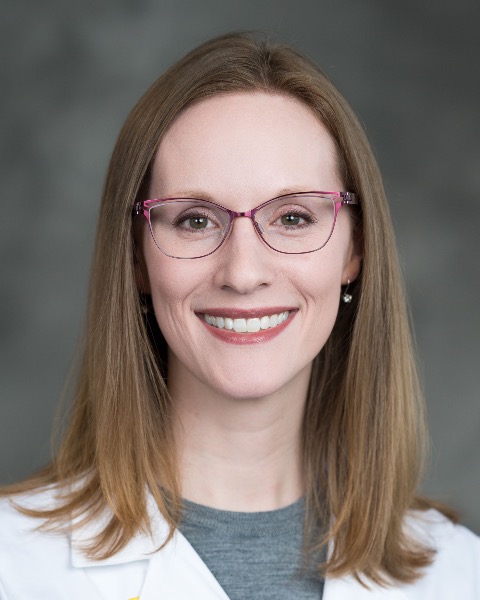 Rachel Reinert, MD, PhD
Rachel Reinert, MD, PhD
Assistant Professor, University of Michigan
Rachel Reinert, MD, PhD is an Assistant Professor of the Division of Metabolism, Endocrinology & Diabetes at the University of Michigan. Dr. Reinert completed her medical and graduate degrees through the Medical Scientist Training Program at Vanderbilt University, where she studied mechanisms of pancreatic islet vascularization and innervation in the laboratory of Alvin Powers, MD. After graduation in 2014, she pursued Internal Medicine residency training and a fellowship in Endocrinology at the University of Michigan. There, she joined the Ling Qi laboratory to study protein quality control systems in pancreatic islet alpha cells and was awarded a K08 grant to further this work in 2021. Her new research laboratory aims to understand the drivers of islet alpha cell identity and function and to determine how these features may be manipulated to enhance islet function in prevention and/or treatment of diabetes.
 Wiramon Rungratanawanich, PhD
Wiramon Rungratanawanich, PhD
Visiting Post-Doctoral Fellow, National Institute on Alcohol Abuse and Alcoholism (NIAAA)
Dr. Rungratanawanich joined the National Institute on Alcohol Abuse and Alcoholism (NIAAA) at the National Institutes of Health (NIH) in August 2019, as a visiting post-doctoral fellow, under the supervision of Dr. Byoung-Joon (B.J.) Song, Chief of the Section of Pharmacology and Toxicology (SMPT). Her research centers on alcohol-mediated oxidative/nitrative stress, post-translational protein modifications (PTMs), inflammation, and crosstalk between the gut-liver-brain axis in the experimental models of alcohol-induced multi-organ damage. She has also conducted translational studies to demonstrate the beneficial effects of melatonin and other naturally occurring antioxidants against tissue injury caused by alcohol or other toxicants. She has been recognized for her excellent research productivities as the recipient of the Research Society on Alcohol (RSA) Junior Investigator awards (2021 and 2022), Dr. Johng S. Rhim’s Outstanding Young Investigator Award (2022), NIH Office of Dietary Supplements Scholar Award with actual funding (2022), RSA Enoch Gordis Research Recognition Award Finalist (2023), and the CSCTR Outstanding Young Investigator Award (2023).
​Dr. Rungratanawanich completed her BSc in Pharmaceutical Sciences (Clinical Pharmacy) from Chulalongkorn University, Bangkok, Thailand (2013). Upon graduation, she worked as a lecturer at the Faculty of Pharmaceutical Sciences, Burapha University. In 2016, she received a full scholarship to pursue her doctorate graduate training and obtained PhD degree in Neuroscience from the Department of Molecular and Translational Medicine (DMMT), University of Brescia, Brescia, Italy (2019).
 Nathan Schoettler, MD, PhD
Nathan Schoettler, MD, PhD
University of Chicago
Dr. Nathan Schoettler, MD, PhD, is an assistant professor in the Department of Medicine, Section of Pulmonary and Critical Care at the University of Chicago. He is a physician scientist with research programs that focus on elucidating how complex genetic diseases perturb immune responses and lead to clinical phenotypes. Dr. Schoettler has a particular interest in identifying and understanding risk factors that contribute to asthma and related conditions.
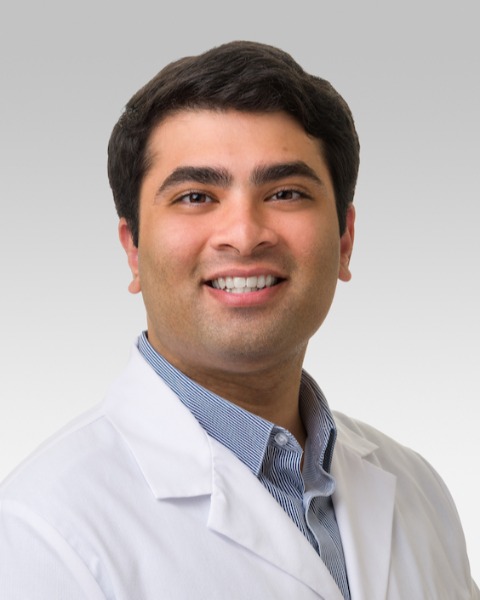 Nilay Shah, MD, MPH
Nilay Shah, MD, MPH
Assistant Professor of Cardiology and Preventive Medicine, and general and preventive cardiologist in the Bluhm Cardiovascular Institute, at Northwestern University Feinberg School of Medicine
 Lisa Tussings-Humphreys, PhD, MS, RD
Lisa Tussings-Humphreys, PhD, MS, RD
Associate Professor/Kinesiology and Nutrition/College of Applied Health Sciences University of Illinois Cancer Center
Lisa Tussing-Humphreys, PhD, MS, RD, is an Associate Professor in the Department of Kinesiology and Nutrition, and Co-leader of Cancer Prevention and Control, at the University of Illinois Chicago and the University of Illinois Cancer Center. Dr. Tussing-Humphreys' research focuses on multilevel determinants of colorectal cancer health disparities in Chicago. She studies diet and neighborhood context as drivers of cancer health disparities mediated through the gut microbiome and stress response systems.
 Nicole Welch, MD
Nicole Welch, MD
Assistant Professor, Cleveland Clinic
Nicole Welch, MD Assistant Professor of Medicine, Cleveland Clinic Lerner College of Medicine, Departments of Gastroenterology, Hepatology and Inflammation and Immunity Cleveland Clinic Dr. Welch is a board certified gastroenterologist and transplant hepatologist who completed her clinical training in gastroenterology, hepatology and nutrition at the Cleveland Clinic. She subsequently joined as a faculty in the Department of Gastroenterology and Hepatology in the Hepatology section at the Cleveland Clinic and is currently an assistant professor in the Cleveland Clinic Lerner College of Medicine at CWRU. She has a joint appointment in the Inflammation and Immunity Departent of the Lerner Research Institute. Dr. Welch has a long standing interest in the management of acute and chronic liver diseases and has published both translational and clinical studies from her undergraduate education, medical school, residency and fellowship. Upon completion of her clinical fellowship, Dr. Welch worked as a T32 fellow and identified that the rate of skeletal muscle loss was dependent on the etiology of liver disease and is a better predictor of clinical outcomes including decompensation and death. Dr. Welch continues to work on the role of hypoia inducible factor and alcohol in muscle loss in chronic liver disease. Her translational expertise is in the field of sarcopenia in liver disease where she has worked with a comprehensive array of models including cellular systems, rodent models, and human patients with liver disease. She is also trained in the use of bioinformatics specifically, integration of unbiased data including assay for transposon accessible chromatin sequencing, RNA sequencing, proteomics and phosphoproteomics and metabolomics.
 Pingwen Xu, PhD
Pingwen Xu, PhD
Assistant Professor, Division of Endocrinology, Diabetes and Metabolism, Department of Medicine, University of Illinois Chicago College of Medicine
Pingwen Xu earned a BA in Animal Science from South China Agricultural University and a PhD in Neurophysiology from Virginia Tech. His dissertation research with Michael Denbow and Paul Siegel investigated the regulation of body weight by hypothalamic neurotransmitters and energy-sensing molecules in chickens. His postdoctoral research with Yong Xu at Baylor College of Medicine identified essential neural populations mediating estrogenic regulation of physical activity and energy expenditure. In 2018, he joined The University of Illinois at Chicago as an assistant professor in the Department of Medicine, Division of Endocrinology, Diabetes, and Metabolism. Research in his lab aims to investigate the metabolic effects of estrogens in the brain.
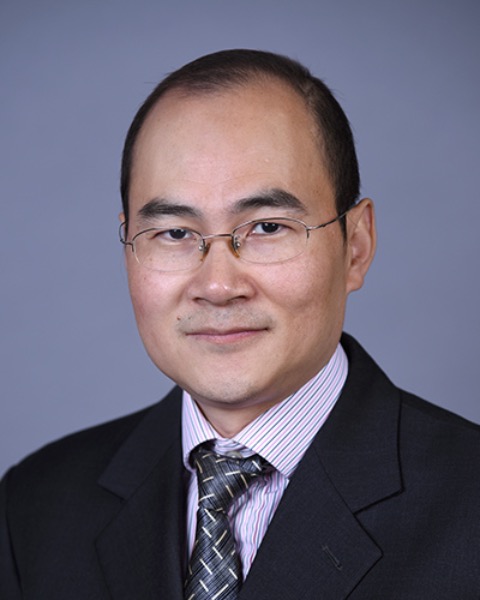 Zhihong(Joe) Yang, PhD
Zhihong(Joe) Yang, PhD
Assistant Professor, Indiana University School of Medicine
Dr. Zhihong Yang joined the Division of Gastroenterology and Hepatology, Department of Medicine at Indiana University School of Medicine in 2018 as an Assistant Professor of Medicine. He earned his Ph.D from the Beijing Institute of Biotechnology in 2009. He completed his post doctoral training at the University of Utah and Jackson Lab. He served as an research assistant professor at the University of Connecticut from 2016-2018 before he joined Indiana University. He is the recipient of the NIH/NIAAA K01 career development award to determine the role of long coding RNA in the pathogenesis of alcohol-induced liver injury. He is also the awardee of the CSCTR Early Career Development Award in 2022. His research focused on the role of long non-coding RNA H19 in the pathogenesis of alcohol-associated liver Disease (ALD) and the circadian pathway and ω-oxidation of fatty acid in ALD.

